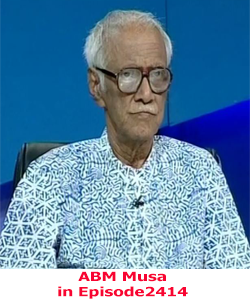A B M Musa

| Journalist |
| Journalism |
Full Name: A B M Musa
Affiliation: Bangladesh Awami League
Current Position: Deceased
Date of Birth: February 28, 1931
Date of Death: April 09, 2014
Place of Birth: Bangladesh
Home District: Feni
Constituency: 267, Noakhali-1
Term: First (1st-1973)
Nationality: Bangladeshi
Profile:
A B M Musa (28 February 1931 – 09 April 2014) was famous Bangladeshi journalist, editor and columnist. He was the Director General of Press Institute Bangladesh (PIB) and General Manager and Chief Editor of Bangladesh Sangbad Sangstha (BSS). He was elected Member of Parliament in the first national parliament election of Bangladesh in 1973 held after the establishment of Bangladesh as an independent state. He was awarded Ekushey Padak for journalism in 1999 by the Government of Bangladesh.
Musa was born at his grandfather's house in Dharmapur village of Chhagalnaiya Upazila of Feni district. His ancestral home is in Kutubpur village of Fulgazi Upazila next to the same district. Musa spent his education at Chittagong Government Muslim High School, Noakhali Zilla School, Feni Government College, and Comilla Victoria College. He gave BA private examination from Chaumuhani College.
Musa started his career as a journalist at a very young age. While in college, he entered the world of journalism in 1950 at the age of 19 through the daily Insaf. The same year he joined the English daily The Pakistan Observer. Until 1971, he was a reporter, sports reporter, and news editor for The Pakistan Observer. He joined Dainik Sangbad in 1952 when the then government of Pakistan shut down the Pakistan Observer during the language movement. In 1954 he returned to the Daily Observer. During the war of liberation in 1971, Musa worked as a correspondent for BBC, Sunday Times, and other newspapers. After independence, he was the General Manager of Bangladesh Television (BTV) and the Editor of The Morning News.
In 1978, Musa joined the Bank as the Regional Director for the Asia-Pacific region of the United Nations Environment Program (ESCAP). Returning to the country, he was the Director General of the Bangladesh Press Institute from 1981 to 1985 and the General Manager and Chief Editor of the Bangladesh Sangbad Sangstha (BSS) from 1985 to 1987. In 2004, he was the editor of the daily Jugantar for some time.
Musa is one of the founding members and lifetime member of the National Press Club. He was elected four times President and three times General Secretary of the National Press Club. He was one of the founders of the Pakistan Journalists Union and the General Secretary of the East Pakistan Journalists Union.
Regarding Musa's entry into the world of journalism, journalist Abu Hasan Shahriar said, "Even before the beginning of institutional journalism, going to see Gandhi was his debut in journalism. When Gandhi came to Noakhali to prevent communal riots, Musa walked ten miles to catch a glimpse of him. After seeing Gandhi, he walked ten miles home again, and when he returned, he started telling the matter to the curious neighbors. Musa was like a preceptor of our post-independence journalism. His news sense was the best of all news editors. When doing page makeup, he would tell which news would be the lead, which was the second, which was the third lead, where to use a photo”.
Politics was not Musa’s favorite subject. When he was asked to contest the 1970 elections during the Pakistan era, he said, "If the country ever becomes independent, I will contest for elections - not now’. After the independence of the country, he responded to the invitation of the then Prime Minister of Bangladesh, Sheikh Mujib and contested from Feni seat as a candidate of Awami League in the general election of 1973 and was elected a member of the first National Parliament of Bangladesh as well as a legislator. After the political change in 1975, he was no longer active in politics, but he was fond of Awami League politics.
Legendary journalist A B M Musa has done some great things in his lifetime. Among them are the practice of putting number plates on vehicles and the modernization of newspapers. The number plate on the vehicles in this country was started by Musa. He did all the changes, extravagance, beauty, and craftsmanship of the present get-up of the newspaper.
Musa was fearless and vocal in his uncompromising criticism of the government. His pen was sharp. He spoke of the rights of ordinary people in his whole life. In the years leading up to his death, even in his old age, he spoke on television talk shows about democratic rights, about the rights of ordinary people. Which is rare at present. At present, most of the so-called journalists are immersed in obsequiousness.
Musa is a successful man who has risen to the national level in journalism. Very few people can go to this position. Many are afraid, to tell the truth in this profession, but he was not afraid. He had the ability to speak the truth with courage. In addition to his courage, his words, deeds, and writings also showed the human side. He did not deviate from the norm in performing his professional duties, he was steadfast in the question of policy. Musa has made significant contributions in various fields of journalism in this country for a long period of 63 years. He has been awarded various awards for his important contribution to journalism. These include the Ekushey Padak (1999), the Jefferson Fellowship (1970), and the Commonwealth Press Union Fellowship (1961).
Musa wrote a book called ‘Mujib Bhai’. This book was published in 2012, contains the narration of his long close association with the founding president of Bangladesh Bangabandhu Sheikh Mujibur Rahman. In the years immediately preceding his death he wrote an autobiography. Later it was published by Prothoma Prakashani.
Musa died at the age of 83 while undergoing treatment in the hospital on April 9, 2014.
Register for comment









